
12 minute read
Interview
EXCLUSIVE INTERVIEW WITH ANNA FURNESS, CEO OF SKOGSENTREPRENÖRERNA
Taking Care of the Forest and the Trees
By Sofie Kinnefors
Anna Furness. All photos: Skogsentreprenörerna
Swedish Association of Forestry Contractors (Skogsentreprenörerna) is tasked with supporting professional business owners working in and for the Swedish forest industry. Skogsentreprenörerna’s objectives are to ensure the health and well-being of an independent and profitable forest industry while respecting and maintaining Sweden’s highly regarded forestry. Swedish Press spoke to Anna Furness, CEO for Skogsentreprenörerna, about member benefits, the “Freedom to Roam“, and why she fell in love with the forest.
With a slogan which for many years read “Din kompis i skogen” (Your friend in the forest), it is perhaps no surprise that Skogsentreprenörerna (SE), its employees and CEO care deeply not only for its members, but also about Nature and the forest industry.
The company, which currently represents 70 percent of Sweden’s professional forestry contractors within the logging, silviculture and planning sectors, offers many benefits to its members.
“We operate by offering advice, support and training packages in finance, law and management to members and other actors within forestry,” says Furness. “We also advice and support member negotiations and offer access to tools to facilitate our members’ businesses.”
Furness describes how being selfemployed can be quite lonely. “Through Skogsentreprenörerna, members become part of one of Sweden’s and forestry’s strongest network for small businesses. They also gain access to an invaluable network.”
Skogsentreprenörerna is headquartered in Stockholm but operates out of 25 Swedish locations, or so
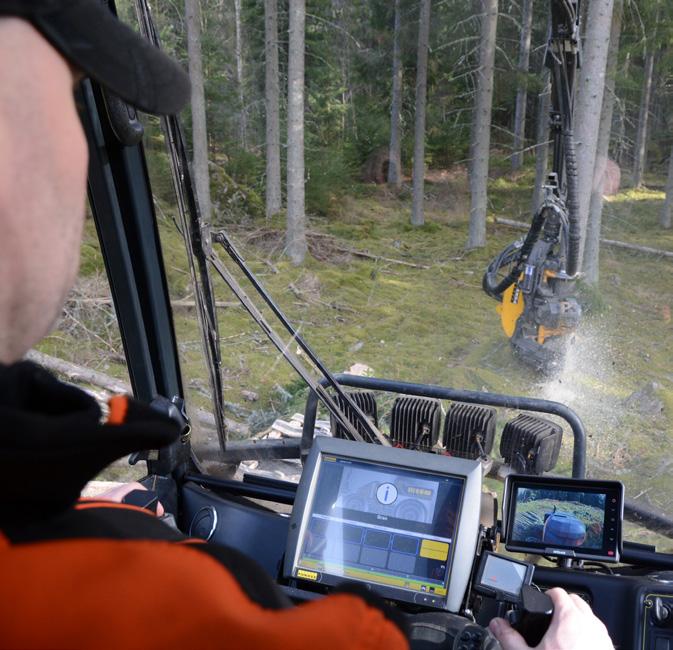
called sections, ranging from Hässleholm in Skåne to Överkalix in Norrbotten. Each section has its own board and chairman. Skogsentreprenörerna’s members regularly receive current information needed to run their forest companies through Skogsentreprenörerna’s magazine, emails and letters. Members are also encouraged to participate in the organization’s fairs and to connect with employees. “Our employees offer professional guidance in questions concerning the industry,” says Furness.
She has worked as CEO for Skogsentreprenörerna since 2014. Her interest in Nature developed at an early age. “My attraction for the environment started during long walks in the countryside with my paternal grandmother. We picked all the flowers we could find! I also enjoyed listening to poetry and melancholic folk songs about the forest. Visa vid midsommartid (Du lindar av olvon en midsommarkrans) is a Swedish song from 1946 by Håkan Norlén and Rune Lindström. It was, and always will be, a favorite of mine.”
Furness realized she wanted to become a forester during a school visit to “Skogens hus” at Stockholm’s outdoor museum Skansen. “We were introduced to a man who told us about the forest. He was a forester. I clearly remember the relief I felt when, at the age of ten, I understood that one could actually work with forestry as an adult.”
The Stockholm native went on to study to be a forester at Swedish University of Agricultural Sciences in Uppsala, and to receive a Master’s Degree in industrial economy at The Faculty of Engineering, Department of Energy Sciences, in Lund. She also studied forestry engineering and management at The University of British Columbia in Vancouver for a year.
EXCLUSIVE INTERVIEW WITH ANNA FURNESS, CEO OF SKOGSENTREPRENÖRERNA
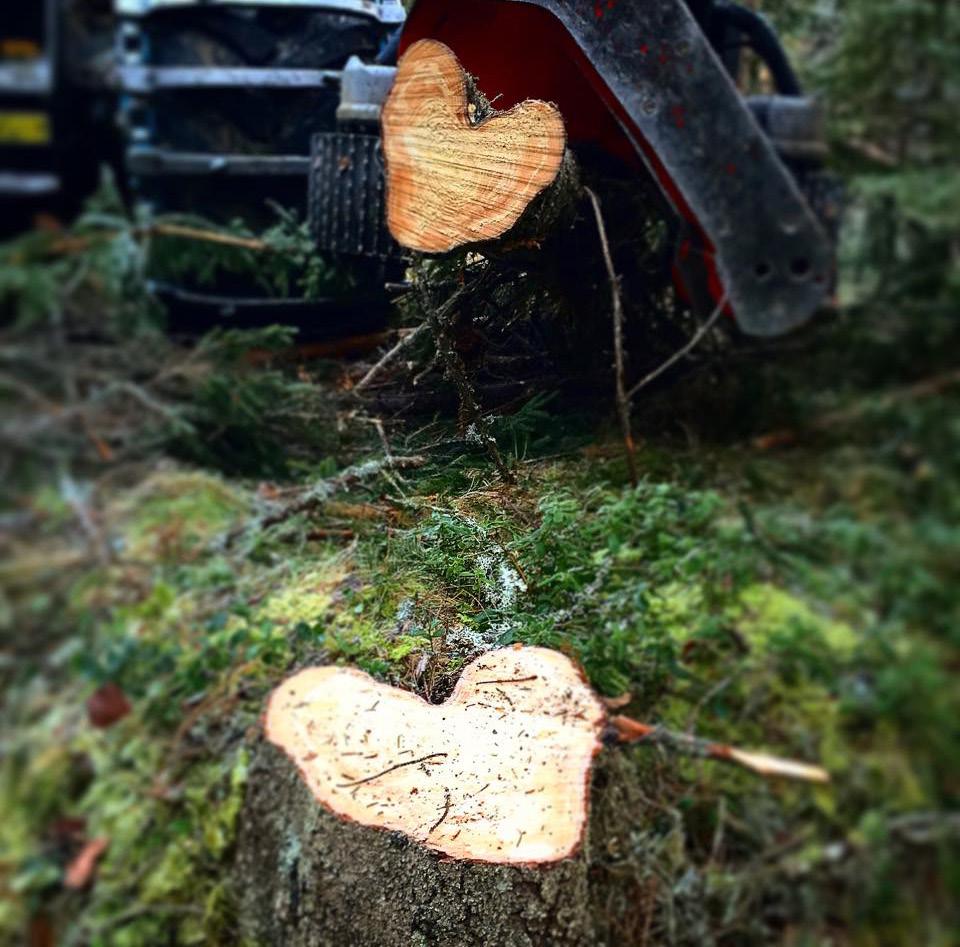
“I grew up in a family of entrepreneurs. Both of my parents worked in real estate, construction and management. Entrepreneurship is in my genes, and I was fascinated when I realized that our Swedish forest value chain is based upon entrepreneurs and family enterprises. Often people think of the forest as being owned by ‘a couple of big company giants’. However, all the operative work in our forests is done by individual business owners. Forest owners and family enterprises possess half of the productive forest land in Sweden.”
Before taking on her current position at Skogsentreprenörerna, Furness did research on the forest value chain at Skogforsk in Uppsala – a central research body for the Swedish forestry sector. She also worked at the Swedish Institute for Standards, SIS. When hired by Skogsentreprenörerna, Furness’ mission as CEO was clear.
“My task is to create a more professional business association, and to position the forest entrepreneur as the central player it is today. I represent and showcase all of the knowledge that our business possesses, so that it benefits our entrepreneurs.”
For an association of forest contractors, the environment and its well-being are crucial. The freedom to roam (Allemansrätten), which gives everyone access to Nature in Sweden, is supported by the organization.
“Skogsentreprenörerna is part of the vitally important Swedish Forestry Industry, which means that we have a huge responsibility to balance productivity and caring for Mother Nature. We work to create a sustainable and efficient forestry while considering what is environmentally appropriate, socially beneficial and economically viable. Protecting the environment for future generations is essential,” says Furness. She continues, “I am proud of the freedom to roam in Sweden. The right does, however, come with responsibilities which must be respected. I also wish that more people would take part in the freedom to roam and what Nature has to offer.”
Like most corporations today, Skogsentreprenörerna is dealing with the current pandemic. Communicating with members about how to care for their business during the spread of Covid-19 is going to be a priority this fall and winter.
“Last spring was highly uncertain for our members. We have put a major effort into giving advice and webinars via Microsoft Teams. Our focus has been supporting members in how to proactively care for their companies
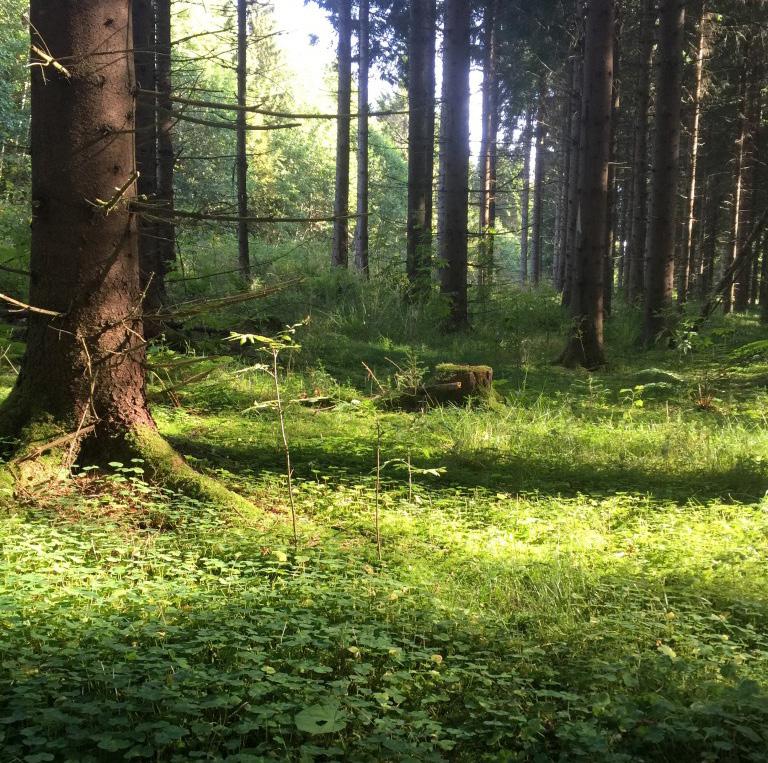
in times of uncertainty. We have done better than we expected, but the future is something we can’t predict in regard to how the Swedish forest industry will be affected in the long term. We are concerned because our industry is extremely dependent today on exports, especially pulp. Skogsentreprenörerna will also focus on new general agreements and on a revision of the industry’s Programme for the Endorsement of Forest Certification (PEFC) standard.”
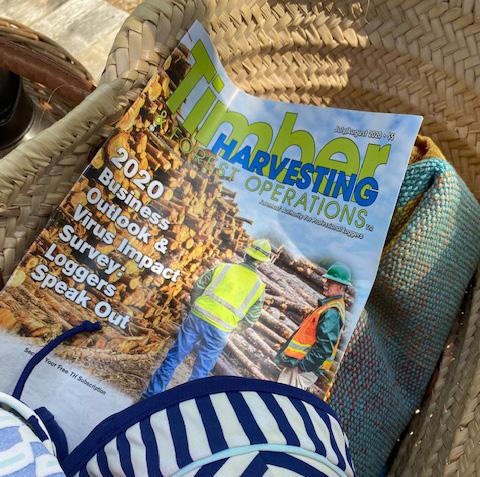
Furness loves spending time outdoors with her family, but also by herself. “I visit the forest as soon as I get the opportunity, preferably on a hill somewhere in Roslagen, Uppland. I’ll enjoy a coffee amongst white moss and distorted hundred-year-old pines.”
Furness spent her summer vacation in the Stockholm archipelago. What the forest-loving CEO brings to read at the beach should come as no surprise. “In my beach basket lays the latest issue from the American Loggers Association. The world is not that big and we always have something to learn from each other.”
For more information about Skogsentreprenörerna and how to become a member, visit www.skogsentreprenorerna.se.
One of the biggest adventures is ...

Global Swedes
Renata Chlumska – adventurer and mountain climber par excellence
Renata Chlumska. Photo: Fredrik Blomqvist
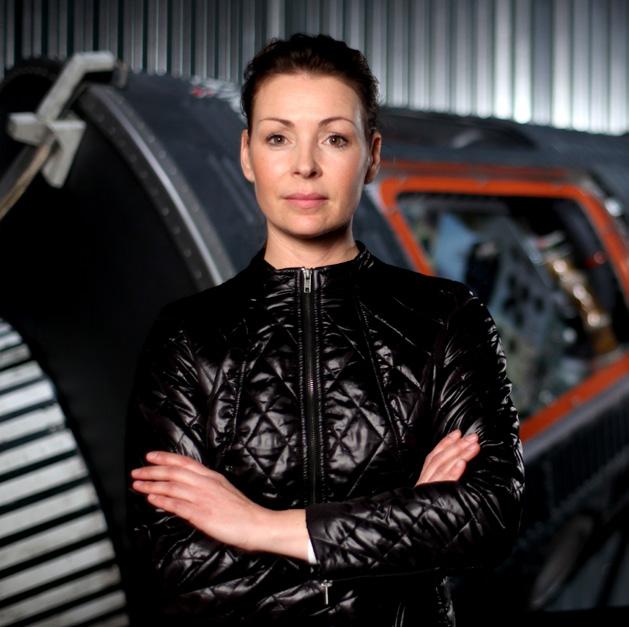
Renata Chlumska is an adventurer and mountain climber. Born to Czech parents, she has both Swedish and Czech citizenship. In 1999, she became the first Swedish and Czech woman to climb Mount Everest. During 2005 and 2006 she paddled a kayak from Seattle to San Diego, bicycled with the kayak on a carriage from San Diego to Brownsville, Texas, continued kayaking around Florida to Eastport, Maine, and then bicycled back to Seattle. She was the first person to circumnavigate 32 states by bicycle and kayak. In the following interview we explore how she acquired her taste for adventure and where it is taking her next.
When and how did you discover that you were an adventure athlete at heart?
I think I have always been an adventurer. It depends of course on how you define “adventure”, but for me it means that you don’t know how it is going to end. Life is one big adventure. I have always been very curious, wanting to know what is around the corner. I have had a very active life, trying out different sports – bicycling, horseback-riding, diving, hang-gliding, martial arts, badminton – you name it. I prefer outdoor sports, and not necessarily competing. One thing I like about adventure is that it is not a competition, because you can’t win against Nature, mountains, oceans. It is more about discovering who you are and maximizing your potential, finding your inner strength which I believe we all have, and measuring it against Nature instead of against other people.
One thing is doing sports out of interest, and another to have it as a profession. For me, that changed when I had an opportunity to go with a Swedish expedition to Mount Everest – not to climb, but as a base camp manager in 1996. This is when I realized that mountainclimbing is what I would like to do, and to pursue it with the passion of a profession.

Why risk your life challenging Nature through mountain-climbing and kayak-paddling in all kinds of weather?
This is a question I get frequently. We know that we only have one life, and for me it is important to maximize it. When I undertake my expeditions – whether it is climbing, kayaking, or bicycling like I did from Nepal to Sweden in 1996 – you expose yourself to Nature and different cultures and people and wildlife. But when I go on an expedition I am very much prepared. I talk to different experts in the areas to gain as much knowledge as possible and understand what I will be facing. I am prepared mentally and physically. Many times during a set time frame we go on with our everyday lives as if nothing is going to happen, and that is when unexpected things occur. Even if I take a higher risk, it is for a limited period of time, and I will have done everything I can to minimize the risks involved.
During a TED Talk you stated that adventure travel allows you to get to know many people and, more importantly, yourself. Please elaborate.
I do a lot of motivational talks. One of the most common questions I get is “aren’t you afraid of being alone, and how do you cope with the loneliness?” For instance, when I did my round-America venture I spent a lot of time by myself paddling in a kayak. Those questions say a lot more about the people who ask them than about me. People are afraid to face themselves. Nowadays
Global Swedes

... being a parent
it is so much easier to hide from oneself by bringing a smartphone which inundates you with so much information that disturb your thoughts. People lose track of themselves, failing to calibrate their compass, leaving no time to reflect and see if they are heading in the right direction. Then they wake up one day to find themselves completely off course.
Having climbed many of the world’s most iconic mountains, you are now setting your sights on space. You are also an advocate for space tourism. What are your plans?
I think everything that has to do with space is fascinating. For me, that is the final frontier. The ultimate adventure is to look at our planet from the outside. It is a life-changing view, according to astronauts I have talked to, and something I really want to experience myself. It is one thing reading about it, and another to do it oneself. I really believe that the advent of commercial space corporations and cooperation will revolutionize how we travel. We need to find alternative and more efficient ways to transport ourselves. People will not stop travelling, but we have to do it in a smarter and more sustainable way. Space, with all the new technologies that are being developed, will change how we fly. I am glad to be part of it at such an early stage.
I have already signed up for a flight into space on Virgin Galactic. I bought my ticket ten years ago, so I have been waiting a long time. I am passenger number 192 in the waiting line. Virgin Galactic represents new technology that pushes the boundary forward. The technology also has to be safe, of course, and that takes time.
One day I would like to go to the Moon. I want to climb the highest mountain there is on the Moon! It is just a matter of time when someone will do it. For the human race it is a natural evolution to aim for the Moon and Mars.

How do you finance your expeditions?
Fortunately, I have over the years developed a relationship with various sponsors. That is partly how I finance my expeditions. I also do my speeches, my motivational and inspirational talks, both in Sweden and abroad. In some cases I have believed in my projects so much that I have succeeded in taking a bank loan – like when I purchased my tickets for the ride into space onboard Virgin Galactic. For me, my expeditions are an investment, and it is up to me how that investment will turn out. So far, they have turned out well.
Given your cosmopolitan background, in which areas do you feel Sweden contributes most globally?
I have always been very proud of what Sweden accomplishes when it comes to technical development, science, R&D, medicine, digitalization – but also in the fields of music and art. Then there is our awareness of the environment. One person cannot change everything; we have to come together to meet the challenges. One manifestation of our environmental awareness is the Allemansrätten, the freedom to roam on private property – an amazing privilege which I value very much, and which also comes with a set of responsibilities.
What lies ahead in your adventure calendar?
You don’t think space is enough?? I don’t know how I can top that. I still do a lot of guiding, although that has been somewhat curtailed recently due to the pandemic. If all goes well, I am guiding a group to climb Sweden’s highest mountain, Kebnekaise, in August. Next year I have at least one trip to Mount Kilimanjaro. I was there last year with a group of climbers. I might have a trip to Everest Camp, and might also do a bit of paddling not far from Jönköping where I live nowadays.
I have three children – two sons aged 11 and 10, and a daughter aged 9 – and a lot of my time is devoted to going on adventures with them. All of them have been with me on Kebnekaise. For the rest I look forward to staying at home, because one of the biggest adventures is being a parent. Interviewed by Peter Berlin










